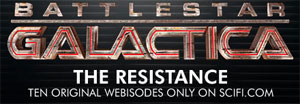 We are just days away from the premiere of season 3 of Battlestar Galactica, the only truly superb TV show in the SciFi Channel’s history. If you’ve read me gushing about Battlestar before you’ll know that I think this series is, in many ways, just about as good as TV gets. A lot of the credit has to go to the show’s writing staff, which keeps throwing shocks and surprises at the audience and tons of bad luck and misery at our beloved characters. Led by showrunner Ron Moore (who I interviewed here), the writing staff examines real world issues through Galactica’s science fiction lens, and they often have me rooting for my favorite characters to do things that would have me enraged if the real world government did them. Actually, I’m already enraged. And the government tends to do these things in real life. Nevermind.
We are just days away from the premiere of season 3 of Battlestar Galactica, the only truly superb TV show in the SciFi Channel’s history. If you’ve read me gushing about Battlestar before you’ll know that I think this series is, in many ways, just about as good as TV gets. A lot of the credit has to go to the show’s writing staff, which keeps throwing shocks and surprises at the audience and tons of bad luck and misery at our beloved characters. Led by showrunner Ron Moore (who I interviewed here), the writing staff examines real world issues through Galactica’s science fiction lens, and they often have me rooting for my favorite characters to do things that would have me enraged if the real world government did them. Actually, I’m already enraged. And the government tends to do these things in real life. Nevermind.
Season 3 of Galactica picks up months after the season 2 finale, when the ragtag fleet finally, after almost a year in space, found an inhabitable planet. After a couple of months on the surface, though, something very bad happened – the Cylons showed up and conquered them. The season premiere will reveal that some characters formed a resistance to fight the Cylons, while others cooperated. Over the past few weeks Scifi.com has been running The Resistance, an unprecedented web series set between seasons 2 and 3 that fill in some of the gaps. There are two episodes left, which go up Tuesday and Thursday of this week, followed on Friday at 9 by the two hour premiere. (click here to watch The Resistance)
The men behind Battlestar Galactica: Resistance are Bradley Thompson and David Weddle. They have also written some of my favorite episodes of Galactica, including Downloaded (which showed us life with the Cylons on old Caprica) and Flight of the Phoenix (where Chief Tyrol builds a new – and very cool – Viper from scratch). Bradley and David got on the phone with me last week from the Galactica writers room to talk about Resistance and what they’re working on for season 3.
How did you approach writing the webisodes? Three minute bursts isn’t your usual way of telling stories – did you guys write thirty minutes and break it into ten parts? Did you write each part separately?
Thompson: We said that we wanted a story that goes about a half hour – we wanted ten 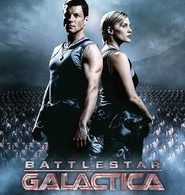 three minute things. Then it was like where does it naturally feel like we’re going to get something exciting you’re going to want to see more of in future webisodes.
three minute things. Then it was like where does it naturally feel like we’re going to get something exciting you’re going to want to see more of in future webisodes.
Weddle: When they initially came to us we could have done just vignettes, and in fact the the staff thought of that approach to the webisodes. But when Brad and I got the assignment we thought, ‘Let’s just tell one story.’ Network wanted it to play into the third season, so that gave us the inspiration to chronicle events that would pay off in the third season.
How did the assignment end up with you guys?
Thompson: Ron came in and said, ‘You guys want to do it?’
Weddle: I think I remember it more like, ‘OK, SciFi’s ready to do it; they’re ready to pay for them. You guys are doing it. Unless you don’t want to.’
Thompson: That was probably closer to the wording.
Weddle: ‘Have a story the day after tomorrow.’ In a day or two Brad and I came up with the concept and a day after that we pitched them to SciFi. We wrote them in four days or something like that, and shot them the next week.
What was it about you guys that made Ron choose you?
Weddle: The fact that I wash his car every week.
Probably just because we’ve been with the show from the beginning.
What was interesting to me about the webisodes is that I had assumed we would see a bunch of characters we had never heard of before, and they ended up including main characters from the series in important roles.
Thompson: What they told us was that we could have anybody that was in Canada. Any of our Canadian actors.
Weddle: Which is actually a considerable number of our cast. We proceeded from there.
The storyline of The Resistance is possibly controversial – it has our heroes hiding their weapons in a temple. How did you settle on that storyline?
Thompson: We thought of characters – have you seen the first two episodes of the new season?
No, sadly I am not that cool.
Thompson: The two characters Duck and Jammer perform actions in those episodes, but what drove them to those? Ron, when he wrote those, hinted at what put the characters in place to do those things and we thought, ‘There’s the story.’
Weddle: While the guns in the temple were definitely influenced by current events, things like that have been going on since the dawn of time. It was just a great venue for raising ethical issues that you could argue both ways with equal effort. It became a great springboard for putting our characters in moral dilemmas for which there are no easy answers.
Thompson: It’s about the big question of where do you draw the lines in a war for survival?
How has the response been to the webisodes?
Weddle: 1.8 million hits as of last week or two weeks ago. I don’t know what the latest was, but in the first two weeks it was 1.8 millions. The amount of hits is way beyond what SciFi expected.
Thompson: They said they’d be really happy with 250,000 streams.
Weddle: What we’re excited about is that we told one story with the ten webisodes. I’m not sure if anyone has done that before – it’s like being around at the beginning of movies. With The Great Train Robbery being the first time telling a story with a movie. Before that movies were fun or current events or they were little dramatic or comic vignettes, but nobody told a story with a beginning, middle or end.
Thompson: What’s fascinating is that you go on the web and people review each three minutes – when does that ever happen? It’s been fun in a weird way to watch how people watch them, and they’ll speculate on what will happen next and they’ll have to wait two days to find out if they’re right. It’s a whole new watch something – normally that process happens while you’re watching an episode, but here it’s delayed gratification on a major scale.
Weddle: The other thing that’s satisfying from a story point of view is television has evolved in the last ten years to serialized storytelling, which used to be forbidden and now many of the major, successful shows are doing it. With webisodes we’ve discovered you can do a layered tapestry with substories going on in parallel or before or after events. You can create something that’s almost like a computer game with labyrinths of story. This is just the beginning; we just took the first step. I have no doubt that ten years from now there will be shows where you can go down a million different story labyrinths that all lead to the main narrative. It’s a totally new frontier in storytelling.
Thompson: It opens this whole realm of layered storytelling and it also gives us a chance to look at characters we don’t have time to on the broadcast version. We got to look at these people – they have stories all their own that we could only touch on in the regular show.
Weddle: It makes you think of what Louis Bunuel was doing with his very innovative movies in the 70s like Phantom of Liberty, where it had no narrative. You would follow somebody driving along the highway and you would get immersed in their story; they would stop for gas and then that character would drive off and you’d stay with the gas station attendant. You follow that person home and it would be a totally different story, and they would make a phone call and you’d follow the person on the other end of the phone. It was breaking up the traditional idea of narratives, and with webcasting you can do that – you can follow a character that leaves the room and have a completely separate set of events.
Thompson: Like with The Matrix when they had the easter eggs, where if you click on the rabbit you can see new stuff. If everything is digital download you can branch out to where you want to go first. Click on Duck – oh, that’s where Duck went. You follow him for a while and then you go back to that branching point and follow what happened to Jammer.
rabbit you can see new stuff. If everything is digital download you can branch out to where you want to go first. Click on Duck – oh, that’s where Duck went. You follow him for a while and then you go back to that branching point and follow what happened to Jammer.
Does the success of this mean we’ll see more web stories from Galactica, maybe something during that hateful break in the middle of the season?
Thompson: What it means is that SciFi will have to make that determination. It also follows up with the Writers Guild – it’s new to them and they’re trying to figure out how do we cover this with a contract, what do we call it, how do we arrange for it? There are all sorts of production issues and financial issues they’ll have to figure out before we can do it again. Fortunately when we were doing it this time we had New Caprica built for the series. We had all these things set up, so while one crew was out there shooting Exodus, we could be out there with a couple of guys using their sets.
The WGA was something I wanted to touch on – at the beginning of the summer this all looked doubtful because the WGA was unhappy with how contract and credit stuff worked with these webisodes – and not just Galactica, but across the board. How did that get cleared up?
Weddle: It hasn’t been. The making of these and the fact that they wouldn’t put any credits on them and compensation issues came to a head and as of right now we’re not allowed, by the Guild, to work on any more of them. So until that’s resolved one way or another – we’ll go back to non-Guild people working on these things or the big media companies will have to come to some kind of arrangement with the Guild so that we can do more. I think the great thing about having done them is that we can show what happens when you hire real writers to do them.
Thompson: Whatever financial model they were using to justify setting them, shooting them and putting them out there to begin with has either been justified or not. This is certainly a conversation you could have with SciFi – I don’t know whether they would tell you or not – but they told us they wanted to do these and put them up there, and they wanted to do it for a reason. They want to make some kind of profit from it, whether it was promoting the show and getting more people to watch or whatever, they expected a good result from it, and if we help them get that result they may work with the Guild to give them what they need to allow us to do it again.
So with this all up in the air there’s not even a guarantee these webisodes will be on the next DVD release.
Thompson: Oh yeah, that’s all up in the air. Even at one point we weren’t allowed to work on them anymore and some of the stuff isn’t finished because we weren’t able to get them done – little things like temp track sound is still in there.
Weddle: The massacre in the temple has temp tracks we were going to loop and fix and make a lot better, but because we were forbidden to work on them anymore they went out as is. Of course people complained when they watched them and it just made us cringe because we very much wanted to correct that.
Thompson: Everybody that worked on it wanted it to be the best possible, and we all said, ‘Oh crap, we wish we had been able to do the best we could do rather than get stopped 9/10 of the way through.’
I talked to Ron Moore a couple of weeks ago and he said that you guys were working on the second half of season three already. What are you two working on now?
Thompson: Episode 16.
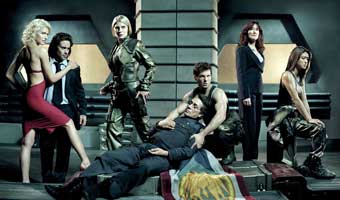 Can you give me any basic information that will not spoil anything?
Can you give me any basic information that will not spoil anything?
Thompson: Bad things happen to good people.
That should be the weekly episode description in TV Guide.
Weddle: It’s a Kara episode with Michael Nankin, who directed Scar, which is one of our favorites that we had an opportunity to write on. I think it will be equally memorable, but I can’t tell you more than that.
When you guys are working on the back end of season three have you looked to the season finale and the possibility of season four?
Thompson: We’ve certainly looked to the finale and we’ve pitched that to the network. We know where we’re trying to go. Nobody has said anything about season four.
That’s funny, and it’s what Ron said to me as well. It almost seems obvious that the show will come back – it’s doing well, there’s a lot of notice in the media, the DVDs sell well, there are so many webisode downloads. You must at least feel optimistic about season four happening.
Weddle: Yeah, but you never know in TV world. Some new reality show might come along, America’s Top Breakdancer, and suddenly the ratings go in the tank and we might not be back.
You said before that episode 16 is about bad things happening to good people – have you guys ever sat down in the writer’s room and said, ‘Let’s have something really good happen to them for once.’
Thompson: I think somebody said that once and we shouted them down.
Weddle: I think lots of positive things happen. Lots of bad things happen, too.
Thompson: It’s all about point of view. If you take the Cylon point of view, lots of good things have happened. They were very successful during that first attack.
Q: When you’re writing are there specific characters that come easiest to you?
Weddle: We love writing for Starbuck. We love writing for Tyrol. We love writing for all of them, but those are characters we gravitate to. I think every writer on staff loves having Tigh in a scene.
Thompson: It’s such a pleasure writing for a cast as talented as Galactica’s, because you know whatever you put out there they’re going to deliver, and they’re probably going to deliver better than you thought.
Weddle: It’s staggering to have this cast.
Q: When you’re writing on a show with as strong and present a show runner as Ron Moore, how does that dynamic work?
Thompson: It’s great because Ron knows where he wants to go; he points at the hill and we take it for him.
Weddle: It’s the greatest creative experience I’ve ever had in television, and I think Brad feels the same way. He’s a brilliant writer and he has a very interesting management style, versus Ira Behr, who’s the reason we’re in this business. Ira Behr gave us a chance and taught us the craft of television writing, and we owe everything to him. He’s a great showrunner too, but it’s a different style, which is you’re there at 9 in the morning, you’re there at every meeting, you’re in your office in case he needs to call you, nobody works at home. Ron comes in, lays out big ideas for episodes and stories, we as the staff break them on our own, apart from him, he comes in, spins it, changes it, elevates the plot of the episode to a whole new level and whoever is writing it goes off and writes it on their own. Nobody knows if you’re at home, at the office, whatever – all you have to do is hit that deadline. And the other little thing is that it has to be good. And then you get a series of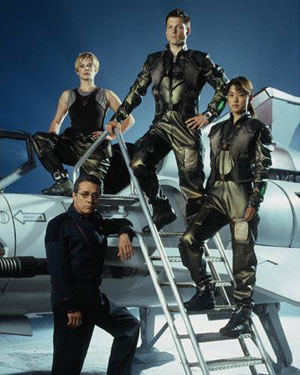 very intense notes as you rewrite and rewrite and rewrite. Ron gives notes that are extremely difficult to execute, not because they’re bad notes but because they’re so goddamned demanding and good.
very intense notes as you rewrite and rewrite and rewrite. Ron gives notes that are extremely difficult to execute, not because they’re bad notes but because they’re so goddamned demanding and good.
Thompson: Ron forces you to do the best that you can do; it’s like working for an Olympic coach.
Weddle: But never done through an authoritative way. You don’t want to let Ron Moore down – you work to get over that bar because the last thing you want to do is disappoint him. You’ll never be yelled at or told you did a bad job, but you know when you didn’t quite hit the bar.
Thompson: The other thing is that when you get one of those notes that if you can pull it off the script will be a lot better than you thought it could be.
Weddle: The one we just did – I can’t tell you specifics – there was a very simple conceptual adjustment to the climax of the show, but once you did it the whole climax was elevated far beyond what it had been in the first draft.
Thompson: If you listen to the podcast of Scar there’s a perfect example in the note he gave us of ‘I see Starbuck curled up naked with a bottle and a gun in the bowels of Galactica.’ If you listen to that you’ll hear how David turned that into the scene that we have, but if we had done that literally there was no place for it in the show.
Weddle: It was absurd on face value, but what it was saying was, ‘You have to take it farther, push it farther out.’ He also said ‘Feel free to ignore this note.’ But you know, no you can’t ignore it. He wants you to go somewhere further than you imagined and you have to push yourself. That ended up being an incredible moment in the show, but at ten at night when you’re looking at the note you’re thinking, ‘Oh fuck, what the hell am I supposed to do with this?’ But after your moment of despair and blind panic you suddenly think, ‘What about this? This might work!’
I know that the occupation storyline will wrap up in the first half of season 3. I almost wish you guys did a full season on New Caprica, because I think you could pull so many interesting stories out of that.
Weddle: We’re not totally ignoring the missing year in the coming year. You won’t feel like we just skipped over it by the end of the year.
Thompson: Some very big stuff happened in that year, and you saw the results you saw in the season finale last year. Those stories will be told.
How much of that missing time did you guys map out before starting work on season 3?
Thompson: We generally write ourselves into a box at the end of the season and write ourselves out of it if they bring us back.
Weddle: Ron likes to upset the entire chessboard. He makes leaps with having the characters change and he does not map out how they got from point A to point B, and when you ask him he says, ‘I don’t know, it just seemed like an interesting thing to do.’ Now he may just not be willing to tell us, but what happens is that the staff sits there and talks about the changes and the clues in the behavior and we start to grow organically from there. A quick example is the Sharon and Helo story on Caprica and Sharon getting pregnant. Ron just wrote a scene where she shows up to rescue Helo and we said, ‘What is she doing, why is she there?’ and he said, ‘I don’t know.’ We started to talk about Cylon backstory and Number Six snapping the baby’s neck and the sad look she had after walking away from snapping the baby’s neck and her asking everybody, ‘Are you alive?’ We began to organically evolve to the notion that Cylons have this hidden insecurity where they don’t feel like legitimate lifeforms. Maybe because they can’t sexually procreate they don’t feel like legitimate lifeforms. Wouldn’t it be interesting if Sharon’s mission was to make Helo fall in love with her and have a baby. It comes from days of talking about that, looking at it, and you grow out of that.
Thompson: As far as your mapping out question, before we wrote any of the episodes in season 2, we had like six stories of how we were going to get out of season 1 and where that was going to get us. We pitched those to the network and they said run with them. Similarly on season 3 we laid out the first five or six –
Weddle: The first six we did in detailed outlines with lines and everything in one giant document, which we had never done before on this show. It was almost like a novel.
Thompson: But Ron does know where he wants the series to end up. He steers us and when it looks like we’re heading towards Pluto, he says, ‘No, no, let’s head towards Saturn a little bit.’ He knows where he wants it all to end up – but we have no idea how we’ll get there. Like at the end of the first season he knew he wanted Laura in jail and Adama bleeding and everybody scattered to the four winds. How we were going to get there we didn’t know.
Weddle: That may seem arbitrary and haphazard from the outside, but I’ve come to respect that process as more organic and more true to the characters. If you lay out a blueprint and it’s a schematic, it’s dead. There’s something dead about that. There’s something about the process of discovery, not knowing where it’s going yet, that’s more organic and true to the characters.
Thompson: And true to life. One thing about Ron is that he’s not afraid to use ideas that are better than his. The actors will bring things to him – Alessandro Juliani, who plays Gaeta, brought things to the character and suddenly we see who this guy is and we start throwing more things in that direction and you find who that person is, and he gets bigger. Like Dualla – she was originally the person who said, ‘Yes, the Vipers are coming in,’ and now she’s married to Lee. That kind of freedom is rare.
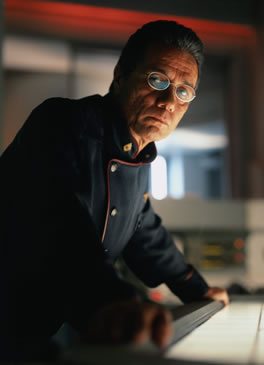 Speaking of Gaeta, is he gay? There’s a big contingent on the internet that thinks – and hopes – so.
Speaking of Gaeta, is he gay? There’s a big contingent on the internet that thinks – and hopes – so.
Thompson: Well he hasn’t tried to date me.
Weddle: I guess in time their questions may be answered or they won’t. I can promise you their questions will either be answered or won’t be.
There are no gay characters on Galactica.
Thompson: That’s not true. There are a number of gay characters. You haven’t picked up on it yet?
Uh oh. Now I’m a bad fan.
Thompson: It’s one of those things where there are probably Catholic characters there too. We just haven’t looked at it yet.
Are you coming at it from the angle that in Caprican society sexual orientation isn’t a big deal, sort of how we learned prostitution was accepted?
Thompson: We haven’t thought of whether somebody is gay or not is an issue, but the truth is that on some colonies it probably is and on some it’s not. It’s similar to the way it is here on Earth, depending on whether you live in Europe or here or the Middle East. There are probably a variety of points of view on that.